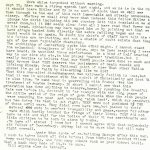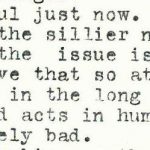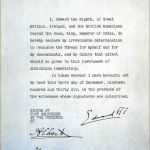Opening this entry, Thomas refers to comments that Anthony Eden had made in Parliament the previous evening which he believes communicated clearly the intentions of both the government and nation. “Eden made a strong speech last night, and as he is in the Cabinet it should leave Hitler and Co in no sort of doubt that we will see them through to the end of this most lamentable and utterly unnecessary misery”.
In an opposing vein, Thomas also makes reference to a speech given by the Archbishop of Canterbury in recent days. The Archbishop during these war years was Cosmo Gordon Lang, the son of a Scottish Presbyterian minister. Graham appears to have been very unimpressed both with the conveyance of the message, and in the message itself. He states “I cannot stand the melancholy dreariness of his voice. Anyone less inspiring I never have heard”. Although a religious individual, Graham rejects the idea suggested by the Archbishop that the ensuing war was in some way a punishment for peoples’ sins “I really decline to believe that our YOUNG people have done so much and so many wrongs that THEY deserve the punishment of Death wounds and lifelong misery”.
The Archbishop is also well-known for a previous speech he had made during the abdication crisis of 1936 when King Edward VIII opted to give up the throne rather than ending his relationship with American divorcee Wallis Simpson. His opinions were considered by some to be uncharitable and “unchristian” towards the departed King. Furthermore, through also making reference to the stammer that impeded his younger brother, the future King George VI, many believed the Archbishop managed to make the new monarch appear weak to the public and perhaps unfit for the position that was then facing him.
Continuing his entry, Thomas goes on to discuss the unfairness for families and communities having to face their second global conflict in the space of just over two decades, contrasting their experiences with former generations and the relative peace that they were acquired to. Britain did of course face conflict in the shape of the Crimean War during the 1850’s and the Boer Wars before the turn of the century, amongst others, but Graham feels that these were “minor wars which hardly touched the fringe of their lives. THEY did not have to sit and wait for the bodies of their wives sweethearts and little children to be torn to atoms by bombs”.
Concluding his thoughts, Graham communicates his appreciation that the media outlets do not seem to be indulging in unrealistic expectations of when the war may end of underestimating the impact that it would again have on the country. Thomas is prepared for “a long and deadly business”, and hopes that although the outcome is in God’s hands, the Allied cause would surely be victorious in stopping the “intolerable” acts of Germany and her allies.
Sources used:
www.wikipedia.org
www.nationalarchives.gov.uk
www.bbc.co.uk/history
www.artuk.org



